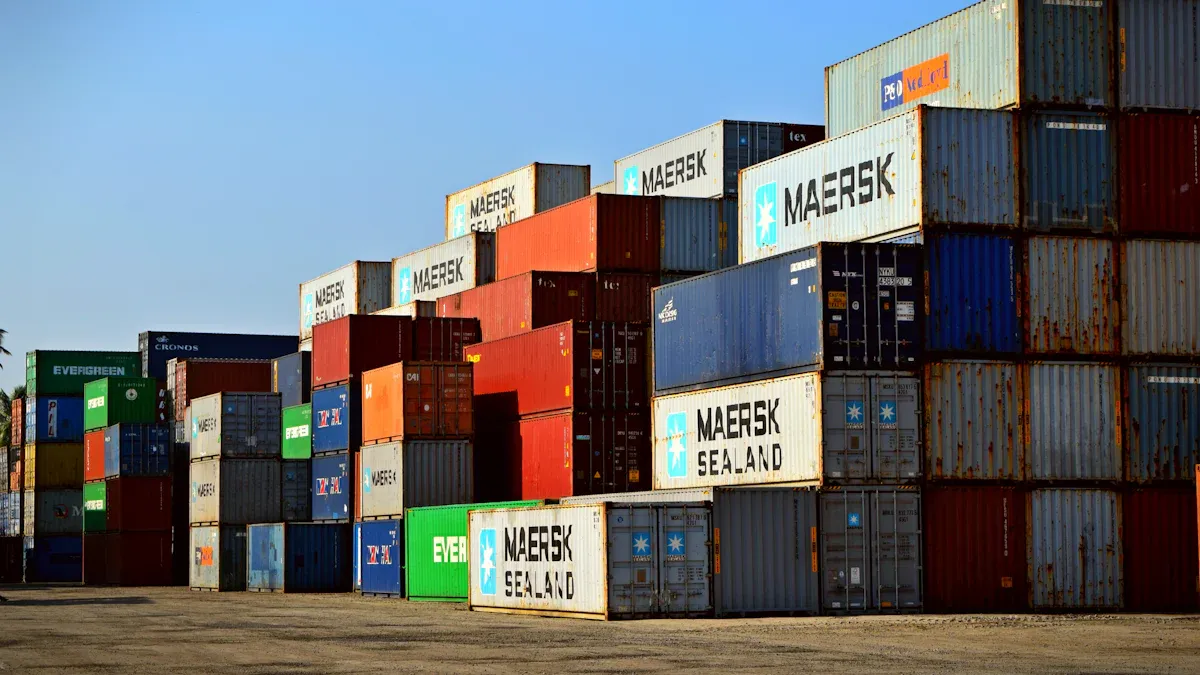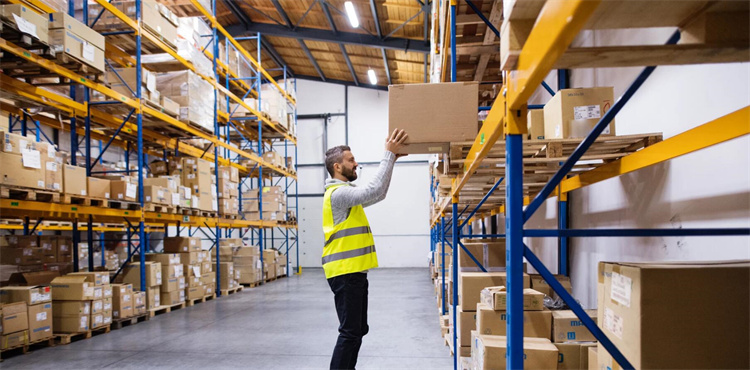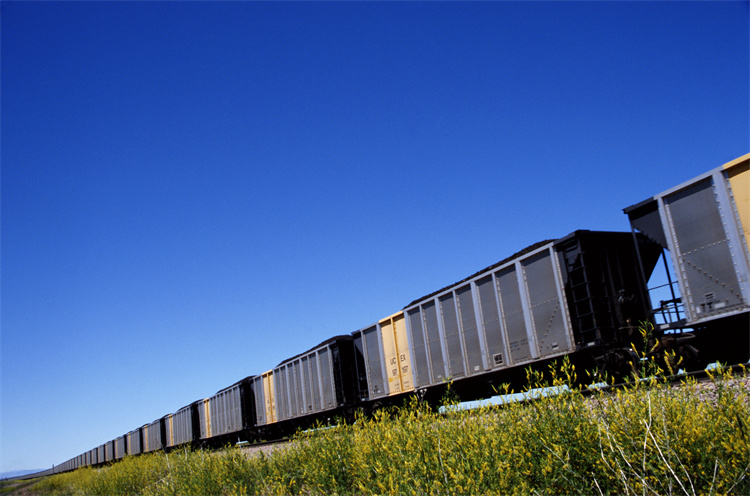Emerging Innovations Supporting Cold Chain Logistics in 2025

Cold chain logistics plays a vital role in global trade, ensuring the safe transport of temperature-sensitive goods. Emerging technologies like the internet of things are revolutionizing this sector. With global agricultural trade exceeding USD 1.1 trillion annually and a projected market growth to USD 260 billion by 2024, cold chain innovations are driving data-driven decision-making and efficiency.
Key Takeaways
Smart sensors using IoT check temperatures of goods in real-time. This stops product damage and keeps items fresh during shipping.
AI helps plan better delivery routes by studying traffic. It saves money, time, and lowers harm to the environment.
Blockchain keeps records safe and tracks products in cold storage. It helps follow rules and builds trust with everyone involved.
IoT-Driven Cold Chain Solutions

Real-Time Monitoring with Smart Sensors
Smart sensors have revolutionized cold chain solutions by enabling real-time monitoring of temperature-sensitive products. These sensors continuously track temperature fluctuations during transportation, ensuring products remain within required ranges. For instance, temperature data loggers provide real-time visibility into environmental conditions like humidity and temperature. This helps you prevent product loss by identifying anomalies early.
IoT-enabled sensors also allow dynamic adjustments to environmental controls based on real-time conditions. They ensure the integrity of temperature-sensitive goods, such as pharmaceuticals and perishable foods, throughout the cold supply chain network. With advanced IoT-enabled tracking, you can make data-driven decisions to enhance efficiency and reduce waste.
Cloud-Based Platforms for Data Integration
Cloud-based platforms play a critical role in emerging cold chain solutions by breaking down data silos. These platforms unify data from multiple sources, providing a single point of access for all stakeholders. You gain real-time visibility into your supply chain operations, which improves decision-making and ensures seamless coordination.
Automated processes further enhance efficiency by reducing manual tasks and operational costs. For example, cloud platforms integrate temperature data loggers with IoT-enabled sensors to offer a comprehensive view of temperature-controlled logistics. This ensures that temperature-sensitive products remain in optimal conditions throughout their journey.
JUSDA's JusLink: Enhancing Cold Chain Visibility
JUSDA's JusLink platform exemplifies how IoT-driven cold chain solutions can transform supply chain visibility. By integrating IoT, cloud computing, and big data, JusLink provides real-time temperature recorders and predictive insights. This ensures the safe transport of temperature-sensitive goods while optimizing operational efficiency.
JusLink enhances supply chain visibility by offering tools for real-time monitoring and data integration. It empowers you to address challenges in temperature-controlled logistics, ensuring compliance and product integrity. With JusLink, JUSDA sets a benchmark for emerging cold chain solutions in 2025.
Artificial Intelligence in Cold Chain Logistics
AI-Powered Route Optimization
AI-powered route optimization is transforming cold chain management by improving efficiency and reducing costs. Logistics software driven by AI analyzes traffic patterns, predicts arrival times, and adjusts travel speeds. This reduces fuel consumption and operational expenses. For example, optimized routes can cut fuel usage by up to 15% and improve fleet efficiency by 20%. You can also avoid traffic congestion and minimize mileage, which lowers your carbon footprint.
However, implementing AI-powered routing comes with challenges. Complex delivery routes, inaccurate addresses, and driver availability can disrupt operations. Despite these hurdles, AI ensures that cold chain logistics remain efficient and sustainable. By addressing these challenges, you can enhance delivery performance and customer satisfaction.
Predictive Maintenance for Refrigeration Systems
AI-driven predictive maintenance plays a crucial role in cold chain management for pharmaceuticals, life sciences, and healthcare. AI analyzes equipment data to identify potential failures before they occur. This reduces unexpected breakdowns and optimizes maintenance schedules. For instance, AI algorithms detect temperature anomalies in refrigeration systems, ensuring product integrity and compliance with regulations.
Real-time monitoring through AI sensors prevents spoilage by maintaining optimal conditions during transit. Dynamic environmental controls adjust settings based on weather and distance factors. These advancements not only safeguard temperature-sensitive goods but also reduce energy consumption. Predictive maintenance ensures that your refrigeration systems operate efficiently, minimizing risks and costs.
JUSDA's AI-Driven Supply Chain Management Platform
JUSDA's AI-driven supply chain management platform exemplifies advanced cold chain management systems. It integrates AI, cloud computing, and blockchain to enhance transparency and efficiency. The platform offers tools for demand forecasting, inventory management, and real-time monitoring. These features are particularly beneficial for life sciences and healthcare industries, where precision is critical.
The platform’s AI-driven predictive analytics enable you to make informed decisions. For example, it provides real-time temperature tracking and automated adjustments to maintain optimal storage conditions. By leveraging this technology, you can optimize your cold chain operations and ensure product quality. JUSDA’s platform sets a benchmark in cold chain management for pharmaceuticals and other temperature-sensitive goods.
Advanced Refrigeration Technologies

Energy-Efficient Cooling Systems
Energy-efficient cooling systems are transforming cold chain logistics by reducing energy consumption and operational costs. Modern technologies like magnetic refrigeration and solar-powered cooling units offer sustainable solutions. Magnetic refrigeration minimizes energy use and lowers carbon footprints, while solar-powered units provide long-term savings by relying on renewable energy sources.
Technology | Benefits | Energy Consumption | Operational Cost Impact |
|---|---|---|---|
Magnetic Refrigeration | Lower energy consumption and reduced carbon footprint | Low | Positive |
Solar-Powered Cooling Units | Sustainable energy source, reducing reliance on traditional power sources | Very Low | Long-term savings |
Real-time equipment monitoring further enhances efficiency. It identifies issues like overvoltage or compressor short-cycling, ensuring optimal performance. Companies like Yotuh Energy have developed electric refrigeration systems capable of achieving frozen temperatures of -25°C in just 30 minutes. These innovations extend operational times for refrigerated products, ensuring their safety and quality during transit.
Innovations in Temperature-Controlled Packaging
Temperature-controlled packaging plays a critical role in maintaining product integrity during transportation. Advanced insulation materials improve thermal performance, ensuring consistent temperatures for sensitive goods like pharmaceuticals and perishable foods. This innovation reduces spoilage risks and enhances safety.
Maintains consistent temperature to ensure product quality.
Reduces contamination risks and minimizes costs associated with spoilage.
Aligns with regulatory requirements and meets consumer expectations.
By leveraging thermodynamics and materials science, temperature-controlled packaging optimizes cold chain logistics. It also reduces waste, enhances brand reputation, and supports eco-friendly practices. These advancements are particularly impactful in the food and pharmaceutical industries, where precision is essential.
Cryogenic and Phase-Change Materials for Cold Storage
Cryogenic and phase-change materials are revolutionizing cold storage by offering efficient and sustainable solutions. Microcapsules containing cryogenic phase-change materials can withstand extreme thermal cycling at -140°C, making them ideal for high-exergy-density applications.
Benefit | Description |
|---|---|
Rapid Freezing | Ensures minimal damage to the samples. |
Energy Efficiency | Recent designs focus on reducing power consumption. |
Space Efficiency | Compared to mechanical systems, they often have a smaller footprint. |
Collaborations with companies like Calgavin and Kaolin Energy have led to innovations in cryogenic heat transfer and fast cooling technologies. These developments not only improve the efficiency of cold storage but also contribute to a "cold economy," where cold and power are cogenerated for maximum resource utilization.
Blockchain for Transparent Cold Chain Logistics
Immutable Records for Product Integrity
Blockchain technology ensures product integrity in cold chain logistics by creating a secure and unalterable record of every transaction. Each step of the product's journey, from storage to delivery, is recorded on the blockchain. This allows you to verify the product's path and condition at any stage.
Blockchain's immutability prevents tampering or fraud, ensuring accurate data on temperature and handling.
Integration with IoT sensors enables real-time monitoring of environmental conditions. Every fluctuation is recorded immutably, allowing immediate action to preserve product quality.
These features make blockchain a reliable tool for maintaining the integrity of temperature-sensitive goods during cold chain transport.
Enhancing Traceability and Compliance
Blockchain provides end-to-end traceability by recording every transaction in the cold chain. This creates a transparent history of the product's journey, which you can access to verify its authenticity and quality. The decentralized nature of blockchain ensures all stakeholders have the same information, reducing discrepancies and building trust.
Additionally, blockchain simplifies compliance with regulatory standards. Its immutable records allow auditors to easily verify transactions and conditions, saving time and reducing costs. Integration with IoT sensors ensures real-time monitoring, enabling you to respond quickly to any issues. These capabilities enhance supply chain transparency and ensure adherence to strict regulations.
Evidence Type | Description |
|---|---|
Streamlined Compliance and Auditing | Blockchain provides an unchangeable record of all transactions, simplifying compliance checks. |
Real-Time Monitoring and Data Integrity | Integration with IoT sensors allows for continuous monitoring, ensuring immediate response to issues. |
Real-World Applications in Cold Chain Solutions
Blockchain has already proven its value in cold chain logistics through real-world applications. For example:
Payment processing becomes faster and more cost-effective by eliminating intermediaries.
Dispute resolution is streamlined using a decentralized database verified by key actors.
Administrative efficiency improves by removing manual data entry and outdated storage methods.
Real-time order tracking enhances security and visibility.
Companies like SkyCell have leveraged blockchain to develop smart refrigerated containers equipped with IoT sensors. These containers monitor geolocation, temperature, and humidity in real time. During the pandemic, SkyCell's solution ensured the safe transport of medicines from Brussels to Mumbai, maintaining required temperature conditions despite external challenges. Blockchain also securely recorded all logistics documents, preventing tampering and ensuring accountability.
These examples highlight how blockchain enhances cold chain transport by improving efficiency, security, and compliance.
Sustainability in Cold Chain Operations
Renewable Energy-Powered Refrigeration
Renewable energy technologies are reshaping refrigeration systems in cold chain operations. Solar energy, for instance, powers refrigeration units through rooftop solar panels, reducing reliance on traditional electricity. Wind energy also contributes by utilizing turbines in suitable locations. These renewable sources not only lower operational costs but also significantly reduce carbon emissions.
Hydropower offers another promising solution. By integrating hydropower into refrigeration systems, you can achieve consistent energy supply while minimizing environmental impact. These technologies ensure that your cold chain operations remain efficient and sustainable, meeting modern environmental standards.
Eco-Friendly Packaging and Carbon-Neutral Transport
Eco-friendly packaging is gaining traction in cold chain logistics. Biodegradable and compostable materials, sourced from renewable resources, reduce environmental harm. Recyclable solutions, such as paper-based materials and recyclable plastics, conserve resources and minimize waste. Reusable packaging systems also provide long-term cost savings while promoting sustainability.
For transportation, adopting electric or hybrid vehicles cuts fuel emissions. Optimizing routes with advanced software further reduces fuel consumption. Additionally, lightweight packaging lowers transportation costs and carbon footprints. By combining these strategies, you can achieve carbon-neutral transport while maintaining efficiency.
JUSDA's Commitment to Sustainable Cold Chain Logistics
JUSDA leads the way in sustainable cold chain logistics by integrating renewable energy and eco-friendly practices. The company’s JusLink platform enhances efficiency through real-time monitoring and data-driven insights. JUSDA also prioritizes renewable energy-powered refrigeration and recyclable packaging to reduce environmental impact.
Through collaboration with supply chain partners, JUSDA fosters shared logistics hubs, minimizing trips and emissions. These efforts demonstrate JUSDA’s dedication to creating a sustainable future for cold chain operations, setting a benchmark for the industry.

JUSDA Solutions
To provide you with professional solutions and quotations.
The integration of IoT, AI, and blockchain has revolutionized cold chain logistics. These technologies enhance efficiency, transparency, and accountability by creating data ecosystems and enabling predictive analytics. You can now manage assets better and make informed decisions, ensuring product integrity across the supply chain.
Looking ahead, challenges like aging infrastructure and tightening regulations will demand innovative solutions. Upgrading storage facilities and adopting sustainable practices will become essential. Companies like JUSDA lead this transformation by setting benchmarks in technology and sustainability. Beyond 2025, you can expect cold chain logistics to evolve further, driven by innovation and environmental responsibility.
See Also
Transforming Logistics: The Role of AI in Supply Chains
Five Key Trends Shaping Future Supply Chain Efficiency
Exploring Breakthroughs in Logistics Technology for Tomorrow
Get Prepared: Discovering New Transport Technologies for Supply Chains
